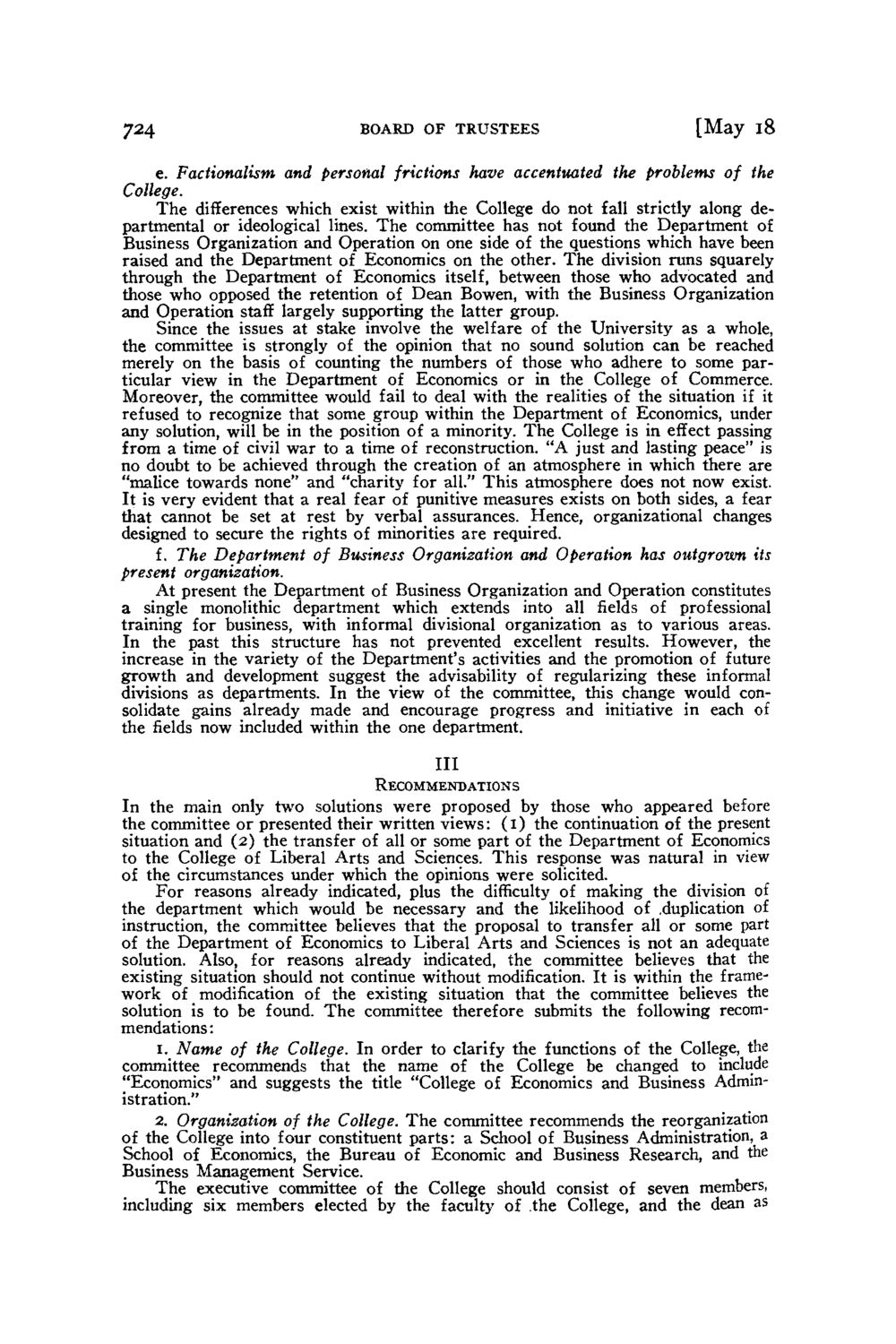| |
| |
Caption: Board of Trustees Minutes - 1952
This is a reduced-resolution page image for fast online browsing.

EXTRACTED TEXT FROM PAGE:
724 BOARD OF TRUSTEES [May 18 e. Factionalism and personal frictions have accentuated the problems of the College. The differences which exist within the College do not fall strictly along departmental or ideological lines. The committee has not found the Department of Business Organization and Operation on one side of the questions which have been raised and the Department of Economics on the other. The division runs squarely through the Department of Economics itself, between those who advocated and those who opposed the retention of Dean Bowen, with the Business Organization and Operation staff largely supporting the latter group. Since the issues at stake involve the welfare of the University as a whole, the committee is strongly of the opinion that no sound solution can be reached merely on the basis of counting the numbers of those who adhere to some particular view in the Department of Economics or in the College of Commerce. Moreover, the committee would fail to deal with the realities of the situation if it refused to recognize that some group within the Department of Economics, under any solution, will be in the position of a minority. The College is in effect passing from a time of civil war to a time of reconstruction. "A just and lasting peace" is no doubt to be achieved through the creation of an atmosphere in which there are "malice towards none" and "charity for all." This atmosphere does not now exist. It is very evident that a real fear of punitive measures exists on both sides, a fear that cannot be set at rest by verbal assurances. Hence, organizational changes designed to secure the rights of minorities are required. f. The Department of Business Organization and Operation has outgrown its present organization. At present the Department of Business Organization and Operation constitutes a single monolithic department which extends into all fields of professional training for business, with informal divisional organization as to various areas. In the past this structure has not prevented excellent results. However, the increase in the variety of the Department's activities and the promotion of future growth and development suggest the advisability of regularizing these informal divisions as departments. In the view of the committee, this change would consolidate gains already made and encourage progress and initiative in each of the fields now included within the one department. Ill RECOMMENDATIONS In the main only two solutions were proposed by those who appeared before the committee or presented their written views: ( i ) the continuation of the present situation and (2) the transfer of all or some part of the Department of Economics to the College of Liberal Arts and Sciences. This response was natural in view of the circumstances under which the opinions were solicited. For reasons already indicated, plus the difficulty of making the division of the department which would be necessary and the likelihood of .duplication of instruction, the committee believes that the proposal to transfer all or some part of the Department of Economics to Liberal Arts and Sciences is not an adequate solution. Also, for reasons already indicated, the committee believes that the existing situation should not continue without modification. It is within the framework of modification of the existing situation that the committee believes the solution is to be found. The committee therefore submits the following recommendations: 1. Name of the College. In order to clarify the functions of the College, the committee recommends that the name of the College be changed to include "Economics" and suggests the title "College of Economics and Business Administration." 2. Organisation of the College. The committee recommends the reorganization of the College into four constituent parts: a School of Business Administration, a School of Economics, the Bureau of Economic and Business Research, and the Business Management Service. The executive committee of the College should consist of seven members, including six members elected by the faculty of the College, and the dean as
| |